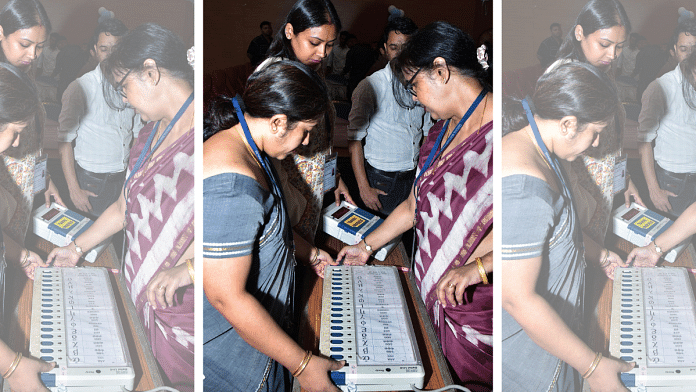New Delhi: Virtually dismissing the idea of scrapping Electronic Voting Machines (EVMs) and returning to ballot paper, the Supreme Court said Tuesday that it would not be right to follow the practice prevalent in other countries.
“Fortunately, we are now in our sixties and have seen what used to happen earlier. Have you forgotten that? If you have forgotten that, I am sorry, I have not,” a division bench of justices Sanjiv Khanna and Dipankar Datta, which was hearing a petition by electoral reforms non-profit Associated Democratic Reforms (ADR), told its lawyer, advocate Prashant Bhushan.
In its petition, ADR and some other petitioners cast doubts over the sanctity of EVMs. In his arguments, Bhushan, on behalf of the petitioners, asked the court for directions to the Election Commission of India (ECI) to match each VVPAT with votes cast through the EVM.
VVPAT is a paper trail printed once a voter exercises their right to vote by pressing the button next to the party of his/her choice. Election officials at each voting booth retain this paper trail on behalf of the ECI.
ADR and some other petitioners expressed their apprehensions about the fairness of voting through EVM, claiming the machines can be manipulated. The court hearing came three days before the first phase of voting for the Lok Sabha polls.
Bhusan, appearing for ADR, suggested that if the paper trail cannot be physically verified, voters must at least be given the slip to deposit it in ballot boxes.
Also Read: From NOTA to win against electoral bonds, how IIM-A professors started ADR to fight for poll reforms
‘Don’t compare elections in India and Germany’
However, although the judges made verbal observations that evinced their reluctance to return to ballot boxes, they posed a series of questions on EVMs and the counting process.
When Bhushan asked Justice Khanna if he was referring to booth capturing, the judge said: “Forget about booth capturing. What happens when ballot papers are… anyway. Let’s not enter into a debate”.
But Justice Datta also took objection to Bhushan drawing an analogy between elections in India with that of Germany, where ballot papers are still used.
When the counsel quoted Germany’s constitutional court as saying that EVMs cannot be trusted, the judge interjected and said: “Conduct of elections in India is a humongous task, not possible for any European country to conduct. Let’s not draw analogies and comparisons from Germany or other countries”.
Justice Datta said the population of his home state of West Bengal is more than Germany’s.
“It’s a very small state,” he said, pointing to the scale of arrangements made for elections in India. Instead of “bringing down the system,” some trust and confidence had to be reposed “in somebody”, he said.
At the same time, he accepted accountability must lie with the body conducting the elections. Curious about how EVMs functioned and the process of storing and counting votes, the judges posed a series of questions to senior advocate Maninder Singh, who opposed the petition on behalf of the ECI.
Later, the bench also refused to accept a private citizens’ poll stating that EVMs are not trustworthy and did not find weight in the argument made by another petitioner that the machines were not foolproof because a public sector undertaking (PSU) is manufacturing them.
“So, you now want the machines to be manufactured by a private sector,” the bench said in reaction to the submission.
The court also found nothing wrong in the rule that deters voters from seeking VVPAT slips. The law states that a voter could ask for VVPAT slips if they cast doubt on their vote. If this apprehension is proven false, the voter could face imprisonment of up to six months and could attract a fine of Rs 1,000.
“There is a reason behind it (rule). If the voter asks for a slip, which he will be entitled to, then the voting process has to stop. Somebody will have to open the machine (EVM) and take it out, (and) the candidates’ representatives will be called. Look at the practical side,” Justice Khanna said as the bench posted the matter for a further hearing to 18 April — a day before the first phase.



